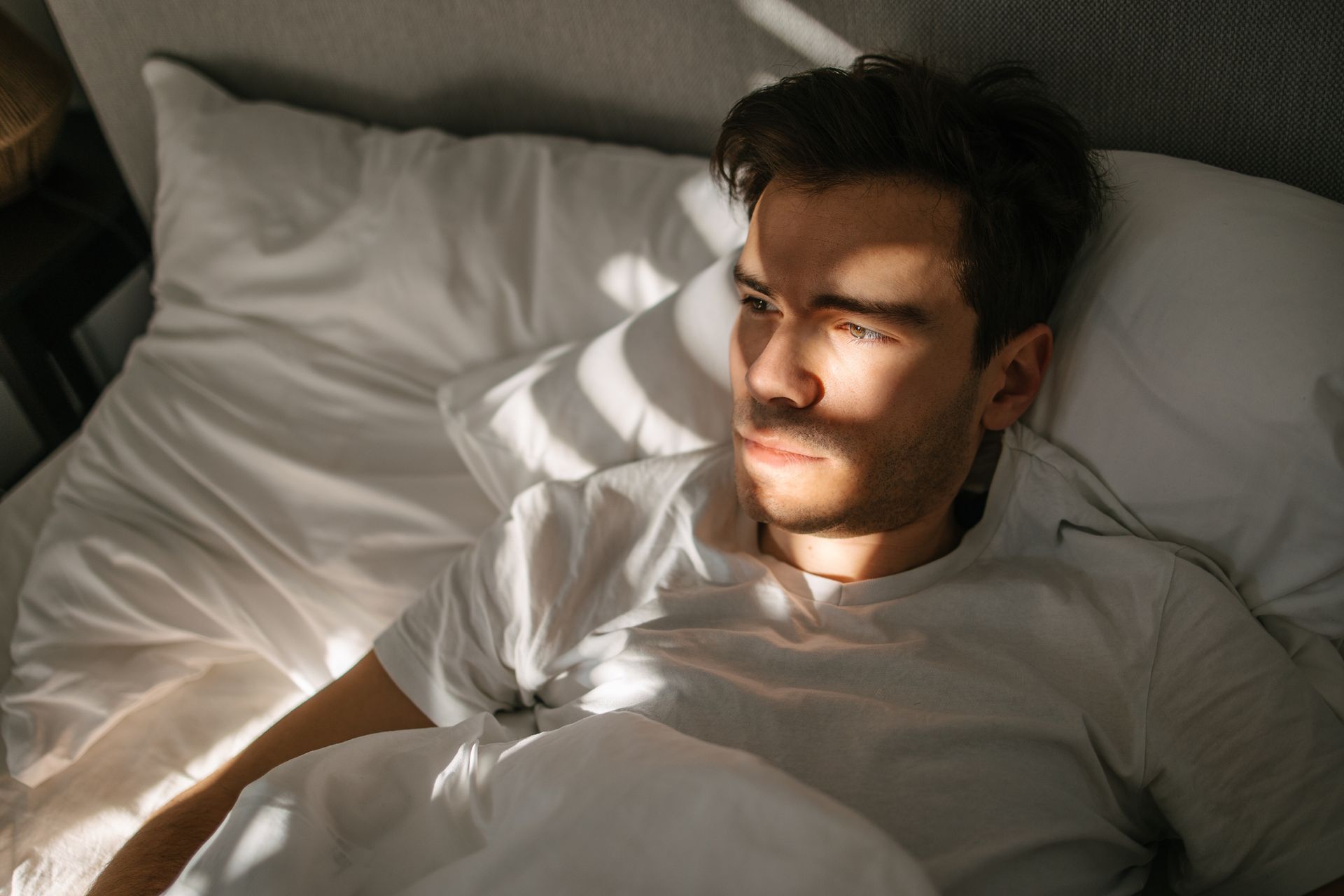Blog

A Simple Guide to Sleep Testing at Home In today’s fast-paced world, many of us are struggling with sleep—and not always knowing why. From snoring and fatigue to waking up gasping for air, these symptoms might point to a sleep disorder like sleep apnea. The good news? You don’t always need an overnight hospital stay to find out what’s going on. That’s where home sleep studies come in. What Is a Home Sleep Study? A home sleep study, also known as a home sleep apnea test (HSAT), is a simplified version of a sleep study that you can do in the comfort of your own bed. It’s generally used to test for obstructive sleep apnea (OSA)—a condition where one stops breathing for periods of time during sleep. Why Choose a Home Sleep Study? Here are a few reasons people opt for home testing: Convenience: No hospital visit, no wires running across your face in a strange bed. Cost-effective: Home tests are generally much cheaper than in-lab studies. Availability: They can often be arranged quickly, especially if your symptoms are straightforward. Comfort: Sleeping in your own environment can give a more accurate picture of your usual sleep patterns. How Does It Work? When your doctor orders a home sleep study, you’ll receive a small portable device, usually with a nasal cannula to measure airflow, chest or abdominal belt to track breathing effort, pulse oximeter (worn on your finger) to monitor oxygen levels and heart rate. Some home sleep tests are worn as a watch on the wrist with only a pulse oximeter on a finger and a small probe taped on the chest. Others are as small as the pulse oximeter only! There are many different kinds of home sleep study monitors. Make sure you choose an accurate one! Setup with a home sleep test usually takes less than 15 minutes, and you’ll wear the equipment for one to three nights. When complete, you return the device, and your sleep data is analyzed by a sleep specialist. A good sleep center will also schedule time to discuss the results with you to make sure you understand the findings and the potential treatment options. Who Should Consider It? Home sleep studies are most suitable for people who: Have symptoms strongly suggesting moderate to severe OSA. Don’t have other serious health conditions (like heart failure or chronic lung disease). Don’t need evaluation for other sleep disorders, such as restless legs syndrome, narcolepsy or REM behavior disorder. If your sleep issues are complex, a full in-lab sleep study (polysomnography) is still be recommended. What Happens Next? If sleep apnea is confirmed, your doctor may suggest lifestyle changes, a CPAP machine, iNAPs machine, an oral appliance, or other treatments. If the results are inconclusive or negative but symptoms persist, a follow-up in-lab study might be the next step. Final Thoughts Home sleep studies have made it easier than ever to take the first step toward better sleep health. They’re accessible, easy to use, and often just as effective as lab tests for diagnosing common issues like obstructive sleep apnea. If you snore loudly, feel exhausted during the day, or your partner notices you stop breathing at night, call a reputable SLEEP CENTER about whether a home sleep study might be right for you.

Why Sleep is So Important: Unlocking the Power of Rest In today’s fast-paced world, sleep often takes a backseat to our busy lives. We push through the day with caffeine, late nights, and constant demands. But the truth is, sleep is more than just a luxury—it’s a necessity! Getting enough quality sleep is essential for our physical health, mental well-being, and overall quality of life. Let’s talk about why sleep is so important and how it impacts every aspect of our lives. 1. Physical Health: Rejuvenation for the Body While we sleep, our bodies work hard to repair and regenerate. This includes muscle repair, tissue growth, and protein synthesis. Sleep is when our immune system gets a boost, making us more resilient to infections and illnesses. It’s also when our bodies manage the release of hormones that regulate things like stress, appetite, and growth. Adequate sleep also plays a crucial role in: - Heart health: Sleep helps regulate blood pressure and reduces inflammation, which can prevent heart disease and stroke. - Weight management: Lack of sleep can disrupt hormones that control hunger, leading to overeating and weight gain. - Physical performance: Whether you’re an athlete or just trying to get through the day, sleep is necessary for muscle recovery, energy replenishment, and improved coordination. 2. Mental Health: The Brain’s Time to Recharge Sleep isn’t just for the body; it’s incredibly important for the brain too. During sleep, our brains consolidate memories, process emotions, and clear out toxins. Think of sleep as your brain’s "clean-up crew." Without enough sleep, cognitive functions like attention, focus, and decision-making take a hit. The mental health benefits of sleep include: - Emotional stability: A lack of sleep can heighten stress, anxiety, and depression, making it harder to regulate emotions. Restful sleep helps keep our moods balanced. - Memory and learning: Sleep helps to reinforce new information and makes it easier to recall important facts, which is vital for learning. - Cognitive performance: Sleep is crucial for problem-solving, creativity, and critical thinking. Without enough rest, our brains simply don’t function at their peak. 3. Improved Productivity and Creativity We often think that sacrificing sleep will give us more hours in the day, but the opposite is true. Sleep deprivation leads to reduced efficiency, poor concentration, and slower reaction times, which ultimately makes us less productive. In fact, studies have shown that well-rested individuals are more focused, organized, and creative. Getting enough sleep boosts: - Focus and concentration: When you’re well-rested, you can tackle tasks with more attention and precision. - Problem-solving ability: A well-rested brain is better at seeing connections, coming up with creative solutions, and thinking outside the box. - Decision-making skills: Sleep helps improve judgment and decision-making by allowing the brain to process all the information it receives throughout the day. 4. Sleep and Long-Term Health: Prevention is Key Sleep doesn’t just affect how we feel today—it also plays a significant role in preventing long-term health issues. Chronic sleep deprivation has been linked to a variety of serious conditions, including: - Diabetes: Poor sleep can affect how your body processes glucose, leading to an increased risk of developing type 2 diabetes. - Obesity: Lack of sleep disrupts hunger-regulating hormones and increases cravings for unhealthy foods. - Alzheimer’s disease: Sleep helps the brain clear waste products, including beta-amyloid proteins that are linked to Alzheimer's. Sleep deprivation can contribute to the buildup of these harmful substances. - Reduced lifespan: Consistently getting poor sleep has been associated with a higher risk of early death. 5. The Importance of Sleep Hygiene Now that we know sleep is essential, it's important to talk about how to improve sleep quality. Practicing good sleep hygiene can help ensure that we get the best rest possible: - Create a relaxing bedtime routine: Turn off electronics, read a book, or meditate to signal to your brain that it's time to wind down. - Stick to a regular sleep schedule: Go to bed and wake up at the same time every day, even on weekends. - Make your sleep environment comfortable: Keep your room cool, quiet, and dark. Invest in a comfortable mattress and pillow. - Avoid caffeine and heavy meals before bed: Caffeine and large meals can interfere with your ability to fall asleep. 6. Conclusion: Sleep is Non-Negotiable In a world that encourages "I will sleep when I'm dead" attitudes or burning the candle at both ends, sleep is often undervalued. But the truth is, we can’t perform at our best, both physically and mentally, without adequate rest. Sleep is a powerful tool for enhancing productivity, boosting creativity, maintaining physical health, and protecting mental well-being. So, let’s prioritize sleep and give our bodies and brains the rest they truly deserve. SLEEP: As important as diet and exercise, only easier! If you want to feel your best and live a longer, healthier life, it’s time to start treating sleep as a non-negotiable part of your routine. Your body, mind, and future self will thank you. Want to learn more? Call me today to set up an appointment to improve your sleep tonight! Kathryn Kane, PhD, RPSGT Behavioral Sleep Therapist Sleepwatchers, PLLC Phone / SMS (847) 838-9253 www.Sleepwatchers.com REFERENCES: 1. Physical Health: Rejuvenation for the Body National Sleep Foundation. (2021). Why sleep is important. https://www.sleepfoundation.org/why-sleep-is-important Harvard Medical School. (2020). The importance of sleep for physical health. https://www.health.harvard.edu/staying-healthy/the-importance-of-sleep 2. Mental Health: The Brain’s Time to Recharge Walker, M. (2017). Why we sleep: Unlocking the power of sleep and dreams. Scribner. Dinges, D. F., & Kribbs, N. B. (1991). Performing while sleepy: Effects of sleepiness on efficiency and productivity. Sleep, 14(4), 311–315. https://doi.org/10.1093/sleep/14.4.311 3. Improved Productivity and Creativity Walker, M. (2017). Why we sleep: Unlocking the power of sleep and dreams. Scribner. Goel, N., Rao, H., & Durmer, J. S. (2009). Neurocognitive consequences of sleep deprivation. Seminars in Neurology, 29(4), 320–339. https://doi.org/10.1055/s-0029-1237110 4. Sleep and Long-Term Health: Prevention is Key Chaput, J. P., Dutil, C., & Sampasa-Kanyinga, H. (2018). Sleeping habits and health outcomes: A review of the literature. Sleep Medicine Reviews, 42, 5-17. https://doi.org/10.1016/j.smrv.2018.07.002 Cedernaes, J., et al. (2016). Sleep and metabolic risk: From genetics to health outcomes. Current Diabetes Reports, 16(9), 96. https://doi.org/10.1007/s11892-016-0789-6 5. The Importance of Sleep Hygiene National Sleep Foundation. (2021). Sleep hygiene tips. https://www.sleepfoundation.org/sleep-hygiene Hvolby, A. (2019). Sleep hygiene in the treatment of insomnia. Sleep Medicine Clinics, 14(4), 365-370. https://doi.org/10.1016/j.jsmc.2019.08.005 6. General Overview of the Importance of Sleep Centers for Disease Control and Prevention (CDC). (2021). How much sleep do I need? https://www.cdc.gov/sleep/about_sleep/how_much_sleep.html Durmer, J. S., & Dinges, D. F. (2005). Neurocognitive consequences of sleep deprivation. Seminars in Neurology, 25(1), 15-29. https://doi.org/10.1055/s-2005-867080




